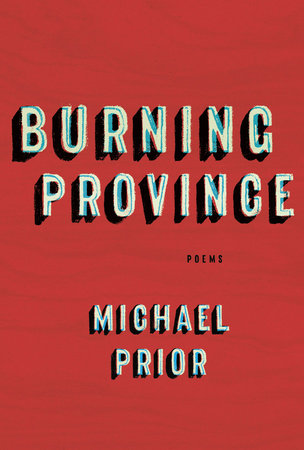How Insistent We Are to Return
Wendy Chen | Contributing Writer

Burning Province
Michael Prior
McClelland & Stewart, 2020
In the opening poem of Burning Province (McClelland & Stewart, 2020), Michael Prior considers the forced relocation of Japanese Canadians into internment camps in Canada during WWII. The poem’s title,“A Hundred and Fifty Pounds,” refers to the baggage limit each adult was allowed to bring into the camps, explores the painful choices individuals—including his grandparents—had to make on what possessions to bring with them. The poem reflects on what might have been brought, as well as left behind, and eventually turns to the question of memory:
. . . Memories, river stones,
metamorphic and worn. How many
might an able-bodied individual carrythrough livestock-stalls and mud,
onto a bus, a train,
into a tiny, uninsulated shack?
Memory and the metamorphosis of memory through time and families is a central obsession of Prior’s captivating second collection. Indeed, many poems concern the memories the poet carries within him. At times, he gestures referentially to them; at other times, he examines them reverently. In each case, memories provide access points for Prior to questions of family, history, identity, and belonging.
Prior is particularly interested in the transformation of memory in the present, along with its deterioration, as in this moment from “Self-Portrait as a Portrait of My Grandfather, December 8, 1941”:
If a memory bears radiation’s
relationship to time . . .
. . . Then, a reborn face’s
parabolic features curve an axis
never crossed . . .
In the intimate and spellbinding world of Burning Province, there are many ways the past is reborn or transformed into the present. The features of one’s face, for example, might be the rebirth of an ancestral face. The violent hostility of a country against its own citizens during WWII transforms into an inhospitable “burning province” during the British Columbia wildfires in the 21st century. A sense of alienation and otherness remerges through generations of a Japanese-Canadian family. “Is it true,” the poet asks in “The Light from Canada,” “that the first things we read and feel / never leave our vocative?”
Even the structure of the book creates echoes of the past by naming a poem in the second half of the book with the same title (“Tashme”) as a poem in the first half. In the first “Tashme,” Prior considers the name of the largest Japanese Canadian internment camp in Canada (“Tashme”), where his grandparents and their families were once held:
At ten, I thought it sounded Japanese—
the name no name but acronyms, initials.
Older, visiting in winter, needles
fall from the pines like chaff’s steel-
storm across my face . . .
In the second “Tashme,” the poet anticipates the wildfires that will scorch the country:
. . . North, northeast,
fires metastasize through the Interior,
though we can’t glimpse the smoke.
I want to say something callous
about the heat. I want to ask when will it begin.
How can one, Prior seems to ask in Burning Province, belong to a hostile or inhospitable country? Or rather, how does one find a sense of belonging within such a country? Prior provides no easy answers but rather tender explorations. One such possibility he explores is relationships with family, friends, and loved ones—in other words, human connection. However, even these relationships are also fraught with tension and anxiety. In “White Noise Machine,” for example, the poet considers his father’s mother:
. . . How old was I
when his mother wished my brown eyes would fadeto blue?
Prior highlights the complexities of relationships to others and the self with a discerning and illuminating eye. Indeed, it is this illuminating gaze that makes Burning Province such a brilliant collection. The poems within are as searing and unforgettable as the fireflies that appear again and again throughout the book:
. . . The fireflies are sunset’s ash.
I realize I have no means
By which to make you a present of the past . . .
The grace with which Prior crafts every line and image eventually resolves itself in the last poem of his book, “Wakeful Things”:
. . . Love,
how inelegantly we leave. How insistent we are to return
in one form or another. I wish all of this and none of it
for us: more sun, more tempest, more
fear and fearlessness—more of that which is tempered, carved,
and worn, creased into overlapping planes . . .
The brilliance of Burning Province resides in Prior’s fearlessness in exploring the pain of memory, as well as the ways in which it is reborn and transformed in the present. Yet, despite the fear, pain, and uncertainty of the past and present, the book still believes in the possibilities of connection and love. Love, Prior understands, is not easy. Thus, the compassion and tenderness, then, in every poem for the metamorphosis of memory and the past make Burning Province a transformative and transcendent experience.
—
Wendy Chen (@wendychenart) is the author of Unearthings (Tavern Books), editor of Figure 1, and managing editor of Tupelo Quarterly. She is the recipient of the Academy of American Poets Most Promising Young Poet Prize and earned her MFA in poetry from Syracuse University. Her poetry, translations, and prose have appeared in Crazyhorse, A Public Space, Mid-American Review and elsewhere. She is currently working on a novel.
